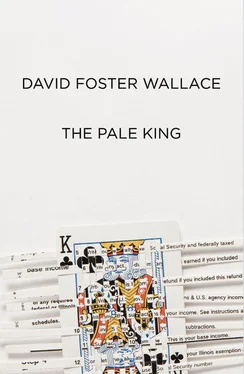‘You’re asking me to describe what I believe his inner reaction might be?’ Drinion says. His face at least isn’t quite the same abraded-looking red when they’re not in the fluorescence of the Pod, a reddishness in people that for some reason always depresses Meredith Rand first thing in the morning.
‘Let’s say I’m curious.’
‘Well, I don’t know for certain. When I was imagining it, my impression was that he’d be frightened.’
There’s a slight change in Meredith Rand’s posture, but she keeps her facial expression very neutral. ‘How come?’
‘My impression is that he’s frightened of you. This is just my impression. It’s hard to explain out loud.’ He stops for a moment. ‘Your attractiveness presents McKenzie with some kind of test that he is afraid he won’t pass. He’s anxious about this. When others are around and he can act out a role, he can go into an adrenalized state that makes him forget he’s afraid. No, that’s not right.’ Drinion pauses again for a moment. He doesn’t look frustrated, though. ‘My sense is that the adrenaline of performing makes the fear feel like excitement. In this type of setting, he can feel as though you excite him. That’s why he acts so excited and pays so much attention to you, but he knows that others are watching,’ Drinion concludes and takes a sip of Michelob; the motion of his arm is very nearly right-angled without being stiff or robotic. There is a precision and economy of movement about him. Meredith Rand has noticed this also during work hours, when she stretches and looks around as a kind of break and looks over and sees Drinion sitting and removing staples and moving different forms into different piles at his Tingle table. His posture is very good without being stiff or rigid. He looks like a man whose back and neck never hurt. He appears confused, or speculative. ‘Fear and excitement seem to be closely related.’
‘Ten Eyck and Nugent do the same thing, though, when the whole table’s going at it like that,’ Rand says.
Drinion nods in a slightly off way that indicates that’s not quite what she has asked to talk about. It’s not the same as his registering impatience, though. ‘In a private, tête-à-tête conversation with you, though, my impression is that he would feel the fear more as real fear. He wouldn’t like being directly conscious of this. Of feeling it. He wouldn’t be sure what it was even fear of. He would be on edge, confused, in a way that could not be made to feel like excitement. If you told him that you found him interesting, I believe he would not know what to say. He would not know how he was supposed to act. I think not knowing this would make Bob very uncomfortable.’
Drinion looks at her steadily for a moment. His face, which is a bit oily, tends to shine in the fluorescence of the Examination areas, though less so in the windows’ indirect light, the shade of which indicates that clouds have piled up overhead, though this is just Meredith Rand’s impression, and one not wholly conscious.
‘You’re pretty observant,’ Meredith Rand says.
Drinion replies: ‘I don’t know that that’s true. I don’t think I have any direct observation or fact-pattern to base this on. It’s a guess. But my guess, for some reason, is that he might actually burst into tears.’
Meredith Rand looks suddenly pleased, which almost literally lights up her face. She reaches out and pats the table smartly with the fingers of one hand. ‘I think you’re right.’
‘Somehow it’s awful to contemplate.’
‘I think he might fall out of his chair and run away crying and flapping his hands hysterically in the air.’
Drinion says, ‘That I couldn’t guess at one way or the other. I do know that you dislike him. I know he makes you feel uncomfortable.’
Drinion is facing Meibeyer’s front windows, Meredith Rand the tavern’s rear section, where there is the hallway and darts area and a decorative display of different types of formal or business-type hats glued by the rims to a varnished board. Meredith Rand leans forward and makes as if to rest her chin on the knuckles of one hand, though it’s easy to see that the actual weight of her chin and skull is not really resting on these knuckles; it’s more a stance than a way of making herself comfortable. ‘And then if I say you’re interesting, though, what’s your inward reaction?’
‘That it’s a compliment. It’s a pleasantry, but also an invitation to continue the tête-à-tête. To make it more personal or revealing.’
Rand waved that hand in a small gesture of impatience or acknowledgment. ‘But how does it make you feel, as they say in Evaluation?’
‘Well,’ Shane Drinion says, ‘I think an expression of interest like that makes a person feel good. Provided the person saying it isn’t trying to propose a level of intimacy that makes you feel uncomfortable.’
‘Did it make you uncomfortable?’
Drinion pauses for another brief moment, though he doesn’t move and his expression does not change. There’s again maybe the smallest instant of blankness or withdrawal. Rand has the sense of an optical reader scanning a stack of cards very fast and efficiently; there is a kind of ambient unsonic hum about him. ‘No. I suppose if you meant it sarcastically it would be uncomfortable — I would think you were angry at me or found me unpleasant. But you gave no sign that you meant it sarcastically. So no, I’m not sure what you meant by interesting, but people naturally like to be found interesting to other people, so the curiosity about just what you mean is not uncomfortable. In fact, if I understand it, it is this curiosity that the remark “You know, if you want to know the truth, you kind of interest me” is meant to arouse. The conversation then becomes about just what the person who said it meant. Then the other person gets to find out just what about him interests another person, which is enjoyable.’
‘Ex—’
‘At the same time,’ Drinion continues, showing no sign that he’s noticed Rand starting to say something even though he’s been looking right at her, ‘someone who finds you interesting seems then suddenly, almost by virtue of their interest in you, more interesting to you. That is a very interesting dimension to it also.’ He stops. Meredith Rand pauses a little extra bit of time to make sure he’s now stopped for good. Like her own left pinkie, Drinion’s left pinkie finger is noticeably puckered and pale from wearing the rubber all day in Exams. There’s no way she even wants to notice Drinion’s clothing enough to even catalogue or characterize it to herself. Just the sweater vest alone is a tremendous downer. She has her white vinyl cigarette case out and unsnaps it and withdraws a cigarette, since it’s just the two of them at the table.
‘So, and do you think you’re interesting?’ Meredith Rand asks him. ‘Do you see how someone could think you’re interesting?’
Drinion takes another sip from his glass and puts it back down. Meredith Rand notices that he places it perfectly centered on the napkin without trying to or without having to adjust the glass’s base in small fussy ways to get it perfectly centered on the napkin. That Drinion in not graceful the way dancers or athletes are, but there is something graceful. His movements are very precise and economical without being prissy. The glasses on the table that are not on napkins have large and variously shaped pools of condensation around them. Someone has selected the same popular song to play twice in a row on Meibeyer’s big jukebox, which has concentric rings of red and white lights on an integrated circuit that allows them to go on and off in such a way that they accompany the chosen song’s bass line.
Shane Drinion says: ‘I don’t think I’ve ever really considered it.’
Читать дальше












